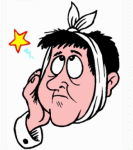| Toothache |

What is a Toothache?
A toothache is a pain or discomfort affecting either a single tooth or, in some cases, a group of teeth. Toothaches are never a pleasant experience, but as any other pain they actually are beneficial for our health by providing an indication that there is a problem in our body. A tooth pain can give us a warning of an injury, inflammation or possible infection that require immediate attention and dental or medical treatment.
Causes of toothache
The cause of a toothache is not always a problem with the aching tooth itself; it can be related to a nearby tooth, to the tissues around it, or even to a non dental health condition. The sensation of pain is most usually caused by the irritation of the tooth nerves due to:
- Tooth decay
- Dental abscess
- Tooth erosion or abrasion
- Tooth injury / fractured or broken tooth
- Gum recession / periodontal disease
- Impacted wisdom teeth
- Bruxism / TMJ disorders
Other toothache causes not directly related to teeth include:
- Sinusitis (sinus infections)
- Ear infections
- Heart disease
- Trigeminal neuralgia
How to stop a toothache?
When you get a toothache, you should visit your dentist for examination without waiting to see if it will pass on its own in a day or two. Delaying treatment may result in worsening the problem, much more severe tooth pain, tooth loss and more expensive treatments.
In most cases the treatment of a toothache will require the involvement of a dentist in order to treat the underlying dental condition causing the tooth pain. For problems like an early tooth decay and tooth sensitivity, a simple dental filling may be enough to stop the toothache. Endodontic therapy (root canal treatment) is necessary when the pulp of the tooth is affected or a tooth abscess is formed. If the tooth is too damaged or a root canal treatment has failed to stop a tooth infection, tooth extraction may be the only option to stop the tooth pain.
Some tooth pain should be considered as normal after several dental treatments such as after a filling, crown, root canal or of course an extraction. But if the pain continues for several days or it becomes extreme, this may be an indication of a complication and you should seek for your dentist’s advice.
Toothache pain relief
If you wake up with an excruciating toothache in the middle of the night, or if you can not reach a dentist, you will definitely need something to temporarily relieve the tooth pain. The most common way for toothache pain relief is the use of over-the-counter painkillers containing aspirin, ibuprofen or acetaminophen which have analgesic and anti-inflammatory properties.
Several toothache home remedies may also offer some pain relief for mild toothaches. The most popular and effective remedies include applying cold on the aching area, and using clove oil or tea bags directly on the painful tooth.
For severe toothaches, especially after a tooth extraction or an oral surgery procedure, your dentist may prescribe stronger tooth pain medications such as Vicodin.
Always remember that toothaches must be treated by a dentist. Any toothache pain relief remedies should only used as temporary and never as long term solutions.
Can a toothache be dangerous?
A tooth pain can indeed be a signal of a more serious health problem with more dangerous complication than tooth loss, so you shouldn't ignore them. The most dangerous conditions that can cause a toothache as a symptom include:
- Angina pectoris, or heart spasm, (caused by inadequate supply of oxygenated blood to the heart muscle because of narrowing of the arteries to the heart) is felt usually as a pain to the chest or left arm, but in around 10% of cases it radiates to the left side of the jaw. Patients with a history of heart disease need to be aware of this possibility, and pay extra attention to a sudden toothache, especially if they are in good dental health. The tooth pain may be a signal of a heart attack.
- Dental abscesses are a common cause of toothaches. If a tooth abscess is left untreated for a long time, the infection may have extended to the floor of the mouth or to the neck and cause a condition known as Ludwig's angina that can become life-threatening, blocking the airway and causing difficulty breathing. If you have symptoms such as fever, chills, nausea which are indications of severe infection, or extended swelling; see your doctor immediately.
Some toothaches are a signal of serious health conditions. A tooth pain in the left side of the jaw has been found to be a symptom of heart diseases and in some cases a sign of a heart attack. Never ignore a toothache. Visiting your dentist as soon as possible can prevent serious complications and reduce the discomfort and cost of the required treatments.
- Dental Plaque
- Dental Calculus
- Gum Disease
- Tooth Decay
- Tooth Abscess
- Toothache
- Tooth Loss
Related Problems
- Root Canal Therapy
- Dental Restoration
- Dental Fillings
- Inlays -Onlays
- Dental Crowns
- Dental Bridges
- Dentures
- Dental Implants
articles about
Tooth Restoration
